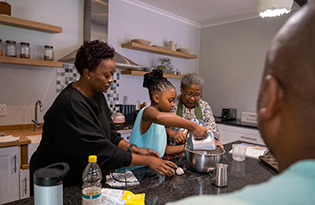Friendship: The common denominator
3/25/2024 by Lisa Burke, L.I.C.S.W., M.S.W., and Candice Kimbrough, M.S.W., L.C.S.W.

Friendships changed when the COVID-19 pandemic hit. People learned to connect virtually, without sharing physical space. The pandemic taught us the importance of human connection and new ways of connecting, no matter the distance. Those connections continue to promote health and well-being throughout various life stages as friendships remain important across the lifespan.
Friendships are important throughout life
Young children. Friends are typically found among those nearby, perhaps children of family friends, or children in the neighborhood. Preschool friendships help children develop social and emotional skills, increase a sense of belonging and decrease stress. At this stage, parents need to model good friendship skills and help encourage friendships that are important to the child.
Adolescents and young adults. Adolescents typically choose to be close to those who share the same interests. Young adulthood is a time when individuals start finding their sense of identity. Young adults need people around them who challenge them to try new things or encourage them when starting new careers. Friendships also evolve when romantic relationships begin.
Adulthood. This is a time when friendships can take a backseat as individuals start families or become preoccupied with their careers. It takes effort to meet up with friends given the needs of family members, whether that be children or elderly parents. However, friends tend to understand (as they are often in the same boat), and when time is spent together, they can often pick up as if no time has passed.
Later adulthood. Friendship circles often begin to decrease due to death, limited mobility or relocation. Depression and loneliness can impact individuals as they experience a shrinking friend group. It's essential that people stay as active as they are able, whether that be participating in religious groups, visiting neighbors, volunteering or engaging in other social activities.
How to care for and nurture friendships
No matter what stage, friendships can protect against loneliness, decrease anxiety and improve one's physical health and well-being, but they do require continued care and nurturing. Here are some ways to make and maintain friendships:
Acts of kindness help maintain friendships. It's not always about buying gifts for a special occasion. Make plans to spend quality time together or go to a family event.
Get together as often as possible, even if that's inviting a friend to do something you're already planning to do. Even with busy schedules, friends can meet to exercise, run errands or have a cup of coffee.
Stay connected, even if you're separated by distance. Do little things — send a care package, pick up the phone instead of sending a text, send an email or a letter in the mail.
Plan a virtual connection if you are separated by distance — plan a video chat, play virtual games together or plan a time to watch a movie or TV show in synchronicity.
Lisa Burke, L.I.C.S.W., M.S.W., is a clinical social worker serving adults in Primary Care in Rochester and Kasson at the Baldwin building.
Candice Kimbrough, M.S.W., L.C.S.W., is a clinical social worker who works with hospitalized patients at Mayo Clinic Hospital in Phoenix, Arizona.
